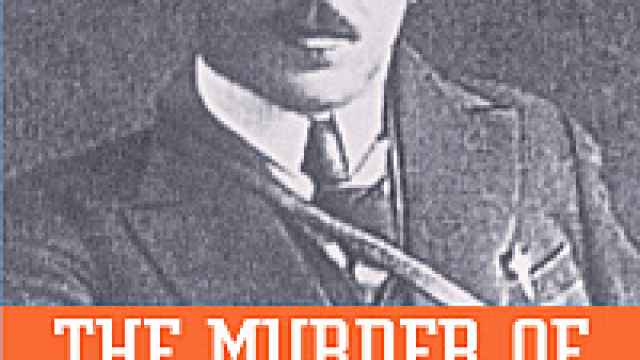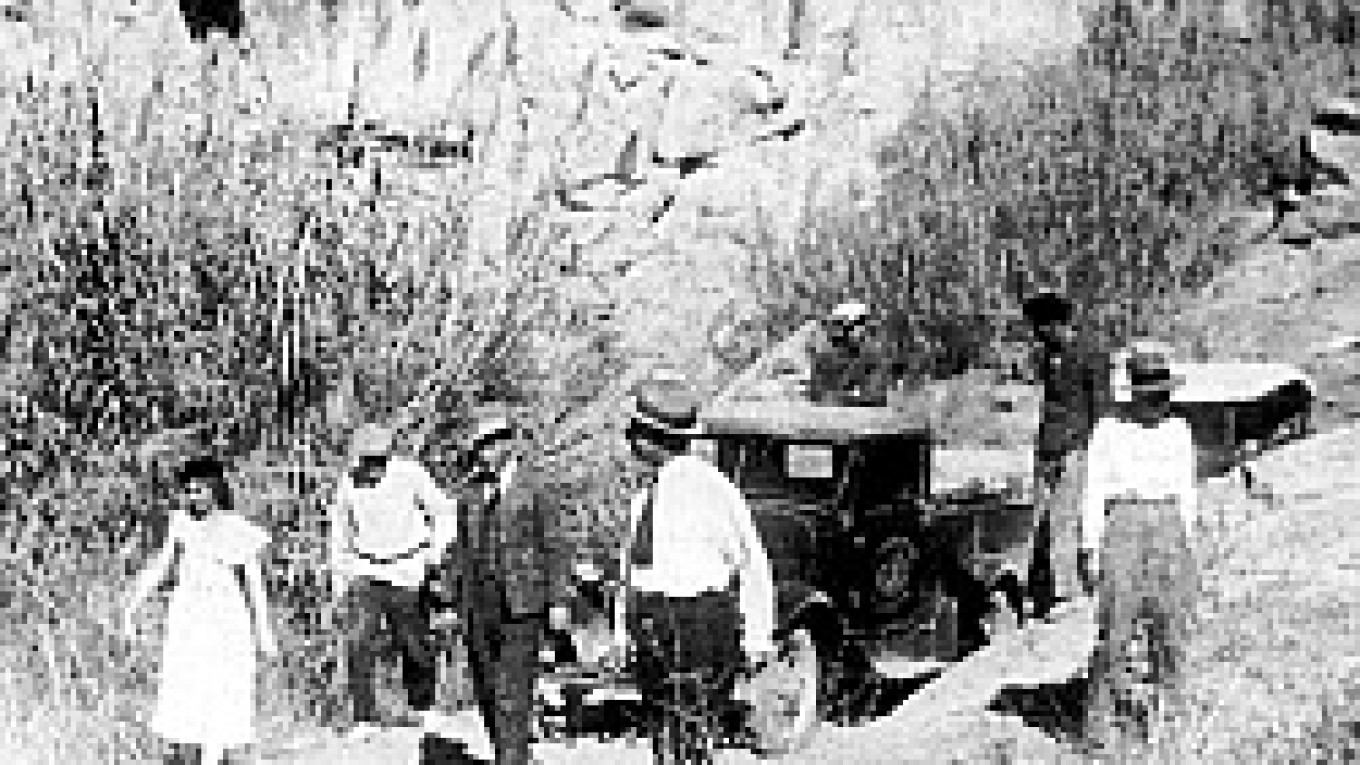Nikolai Vavilov was a bogatyr, as the Russians say, a man of extraordinary talents. Born in Moscow in 1887, into the family of a peasant who had made a fortune in the textile industry, Vavilov turned his back on a business career in the last chaotic decade of tsarist rule in order to study plant biology. Educated at the University of Cambridge under William Bateson, founder of the science of genetics, and a visitor to the fruit fly lab at Columbia University where Thomas Hunt Morgan was developing Gregor Mendel's laws by proving that chromosomes were the carriers of heredity, Vavilov was a botanical Indiana Jones who crossed deserts and climbed mountains hunting lost specimens on five continents. From 1916 to 1933, he made expeditions to many parts of the world, including Iran, Afghanistan, Ethiopia, China and Central and South America in his quest to create what ultimately became one of the world's largest seed collections.
Amid revolution and civil war, Vavilov became a professor of agronomy in Saratov, a Volga port on the edge of Russia's fertile black-earth farmland, where he pursued research into breeding more productive crops, which the Bolsheviks would need to offset future famine. At first, Vavilov struck up a rapport with Vladimir Lenin, who understood the ultimate economic promise of his botanical expeditions. As head of the Academy of Agricultural Sciences, Vavilov established 400 research institutes throughout the Soviet Union and collected samples of 50,000 varieties of wild plants and 31,000 wheat specimens. With the death of Lenin, in 1924, the Kremlin's enthusiasm began to wane.
Stalin hated genetics ?€” and chromosomes in particular, not least because the idea of genes as physical structures passed down through the generations suggested that nature wasn't changeable. His five-year plan for agriculture was a lethal mixture of science and ideology. It borrowed from the French biologist Jean-Baptiste Lamarck a belief in the inheritance of acquired characteristics (e.g. that giraffes grew long necks because they stretched their heads higher and higher to reach the fruit on trees). Such a belief has never been experimentally verified, in spite of many attempts, but it fit perfectly with the Bolshevik view that people could be re-educated to think and act differently from their bourgeois predecessors, that one generation's suffering and torment could produce a new kind of being, Homo Sovieticus.
Using a wide variety of memoirs and archival documents, Pringle shows how the internationally acclaimed Vavilov was outmaneuvered by the "barefoot scientist" Lysenko, an uneducated peasant whom Stalin no doubt preferred to the unreliably bourgeois professor. Lysenko promised the Soviet leader that he would turn the Russian wasteland into a grain-laden Garden of Eden, using the bogus science of "vernalization" to eliminate the normal two-year growth cycle of winter wheat.
 Simon & Schuster The Murder of Nikolai Vavilov: The Story of Stalin's Persecution of One of the Great Scientists of the Twentieth Century By Peter Pringle Simon & Schuster 370 pages. $26 | |
At several plant-breeding congresses from 1929 to 1930, Lysenko denounced Vavilov as a purveyor of "Mendelist-Morganist genetics" but he always lacked a proper knowledge of the science. (At one Party meeting, Lysenko was advised to link vernalization with a known authority such as Charles Darwin. His reply was to ask who Darwin was and where he could meet him.) This Soviet need to unite theory and practice in science was a key difference between the U.S. and Russian approaches to agriculture. Stalin's economist Nikolai Bukharin, for example, spoke about the "primacy of practice;" that a scientific theory was only "correct" if it led to practical success. Vavilov united theory and practice in a different way. His world-famous collection of seeds promised to "direct the evolution of cultivated plants and domestic animals according to our will." Yet, while Lysenko vowed to produce miracle plants that would turn the deserts green, Vavilov patiently explained to the Soviet leader that, using the new science of genetics, it would take up to a dozen years to breed improved varieties.
In August 1931, Stalin issued an astonishing and totally impractical demand. The normal period required to develop new crop varieties was to be reduced to four years. It was clear that Vavilov's rational arguments were losing out to Lysenko's mystical theories. Lysenko rose to the top of the Soviet hierarchy in science, while his opponent was attacked as an anti-Soviet agent and kept under constant surveillance. The only reason he wasn't arrested until 1940 was that Stalin feared the adverse reaction of Vavilov's many international admirers. The outbreak of war gave the NKVD a perfect smokescreen to make the unwanted genius disappear.
He was imprisoned first at the dreaded Lubyanka in Moscow, and then in a concentration camp at Saratov. But his interrogators could never break Vavilov even under torture. Indeed, his resistance became a source of pride among his admirers. Vavilov, they claimed, did better than Galileo, who was accused of heresy by the Vatican for believing that the sun, rather than the earth, was the center of the universe, and who recanted his ideas under threat of being burned as a heretic. Vavilov never renounced his belief in genetics and Mendel.
A British journalist and longtime Russia-watcher, Pringle tells the story with great verve and even clarity in the face of sometimes complex science. Yet the real achievement of this biography is to show that the Russian Revolution left more than physical damage in its wake. Not only did it ruin millions of lives, it also destroyed science and culture. Pringle describes a world distorted by ideology, a terrifying place where ideas were literally a matter of life and death. To disagree with Lysenko risked the gulag.
The only false note is the title itself, "The Murder of Nikolai Vavilov," which seems a little shrill, given that Vavilov, unlike many of Stalin's enemies and even friends (Leningrad Party chief Sergei Kirov, for example), wasn't actually murdered at all. He was arrested and sentenced to death, later commuted to life, and then died of malnutrition, in 1943, in the Saratov camp.
The bogatyr was posthumously rehabilitated and his reputation restored two years after Stalin's death in 1953, but the negative effect of Stalin's anti-Mendelian crusade damaged perhaps irreparably the Soviet Union's capacity to fight the Cold War. Soviet agriculture was never able to match its U.S. counterpart in terms of improving yields. In that sense, you could say the persecution of Vavilov led directly to the fall of the Soviet Union, which people often attribute to the space race or industry or oil. The irony is that it was agriculture finally that killed off the Soviet Union because the Communists had to import grain from the United States. Unfortunately, you can't grow peas in the desert, as Vavilov understood.
Hugh Barnes' "The Stolen Prince," the story of Alexander Pushkin's African great-grandfather, was published in 2006.
A Message from The Moscow Times:
Dear readers,
We are facing unprecedented challenges. Russia's Prosecutor General's Office has designated The Moscow Times as an "undesirable" organization, criminalizing our work and putting our staff at risk of prosecution. This follows our earlier unjust labeling as a "foreign agent."
These actions are direct attempts to silence independent journalism in Russia. The authorities claim our work "discredits the decisions of the Russian leadership." We see things differently: we strive to provide accurate, unbiased reporting on Russia.
We, the journalists of The Moscow Times, refuse to be silenced. But to continue our work, we need your help.
Your support, no matter how small, makes a world of difference. If you can, please support us monthly starting from just $2. It's quick to set up, and every contribution makes a significant impact.
By supporting The Moscow Times, you're defending open, independent journalism in the face of repression. Thank you for standing with us.
Remind me later.


